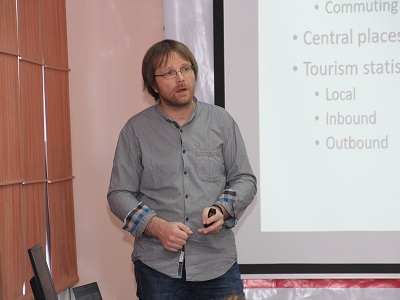ISET hosts Dr. Anto Aasa of Tartu University
- Details

On Wednesday March 27, ISET hosted Dr. Anto Aasa, a Research Fellow in Human Geography from the University of Tartu, who delivered a seminar to ISET’s BA and MA students entitled ‘Use of mobile positioning data in mobility studies’.
During the seminar, Dr. Aasa introduced a research project conducted by the Research Group in Mobility Studies at Tartu University. They used Information & Communication Technology (ICT)-based services to analyze different societal processes. Among other ICT-based datasets, the CDR (Call Detail Record) data consists of log-files collected by mobile network operators to monitor and keep track of billable calling services used by their clients. The dataset contains information about the phone call initiator (the unique and anonymous ID), time of calling activities, as well as the location of the mobile antenna where the call activity was made. This kind of data shows the respondent’s social background (gender, age and language) and other secondary characteristics, such as anchors (ie home/work environments) and transport demand. This is widely used in tourism statistics in local, inbound, outbound levels.
ISET hosts Dr. Lotta Björklund Larsen of Stockholm University, discusses tax compliance
- Details

On March 26, ISET hosted Dr. Lotta Björklund Larsen of Stockholm University, Sweden, who presented a paper entitled ‘Tax Compliance. A Review of Recent Studies’.
“How are people made to pay tax, at the right time and the right amount?” Dr. Björklund Larsen began. “How are they made to comply? This is an eternal research question for tax collectors, law and policy makers, politicians, as well tax scholars. It is also a question that cannot be answered from the perspective of one scientific angle. In this presentation I reviewed research about tax compliance drawing on recent studies from economics, political science and anthropology. I argued that in order to understand why we pay tax—that is, why we comply with taxes and taxation—as well as why we avoid doing so, we have to look beyond legal changes, psychological experiments, economic results, the organization of revenue collection and all actors’ practices in society’s tax arena and study the type of relations, and expectations, that taxpaying is seen to create in society.










